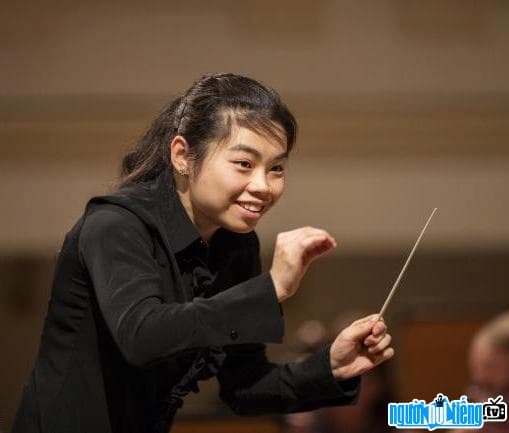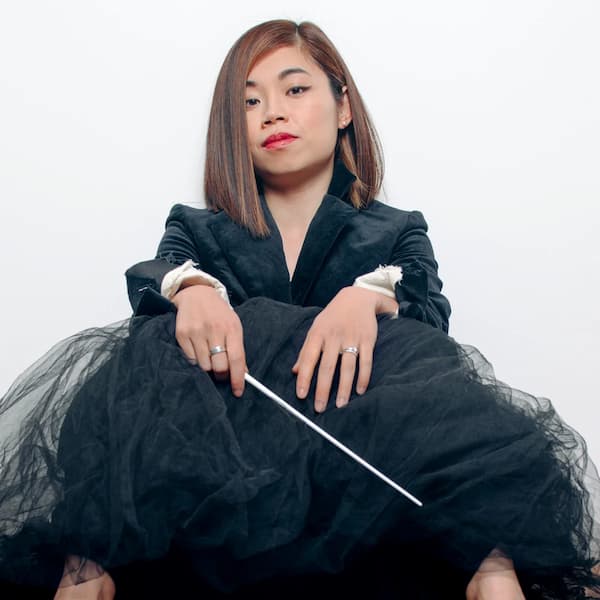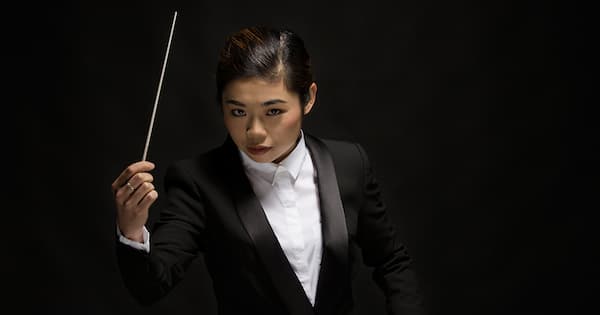In 2014, Elim Chan won the Donatella Flick LSO Conducting Competition as the first female conductor to win the competition in its history. “When I won that competition,” she explained, “history wasn’t something that came into my mind straight away… but I am glad that I have broken a glass ceiling.” As part of winning the competition, Chan was named assistant conductor of the London Symphony Orchestra and subsequently took up appointments at NorrlandsOperan and the Antwerp Symphony Orchestra.
Elim Chan Conducts Tchaikovsky’s Swan Lake Suite, Op. 20a (excerpt)
Hong Kong

Elim Chan
Elim Chan was born in Hong Kong on 18 November 1986. She took piano and cello lessons, and choir singing was an integral part of her childhood. Yet, growing up in Hong Kong, she was told by her parents to become a doctor, a lawyer, or do business. Her father is an artist, and he knew how difficult it would be to pursue the arts, and he always told her, “If you don’t do it 100%, don’t even touch it.”
Music was clearly on the radar, however, specifically when Elim attended her first classical concert in Hong Kong. At the age of eight, as part of her primary school studies, she attended an educational concert with the Hong Kong Philharmonic Orchestra. She remembers, “The conductor explained we were going to hear Holst’s Planets and Stravinsky’s The Rite of Spring and talked briefly about the works. I was fascinated by this figure – everything happened when he started waving his hands. It seemed to me like magic.”
Maurice Ravel: Daphnis et Chloé Suite No. 2 (Antwerp Symphony Orchestra; Elim Chan, cond.)
Smith College

Chan also took inspiration from hearing the Hong Kong Sinfonietta conducted by its then female director Yip Wing-sie. As she recalls, “Watching someone like me on stage left a strong impression.” And at the age of 13, she briefly conducted the school choir, describing that moment as magical. “I loved that feeling that I had the magic at my fingertips… and I thought I wanted to make magic.”
While conducting was always something Chan dreamed of, she initially put her ambitions on hold. She began her studies at Smith College in the US with the aim of becoming a medical doctor. Chan did not take any music classes during her first semester, yet continued to sing in a choir after classes. The choir conductor, Deanna Joseph, told her that she had good ears and that Chan could be an assistant conductor. However, Elim Chan was not yet fully convinced.
Elim Chan Conducts Rimsky-Korsakov’s Scheherazade
A Change of Heart

Many people told her in “both loud and soft ways that conducting is a very difficult and lonely path, especially for a petite, young woman, and for a while, I was too fearful to trust my gut feeling that I could and should be a conductor.” However, Chan also received plenty of encouragement, and she was given opportunities.
As she remembers, “conductor Jonathan Hirsh gave me the opportunity to conduct the “Dies irae” from Verdi’s Requiem. In this piece everything is dramatic—hell is opening up, the bass drum is pounding, there are big choruses. There were men and women singing; there was a huge orchestra. I didn’t think I actually had the guts to conduct it.” Eventually, Chan started to see the role of conductor as a conduit for the music and people, and wanted to facilitate the music-making process and help the audience to experience something meaningful.
Frédéric Chopin: Piano Concerto No. 2 in F minor, Op. 21 (Benjamin Grosvenor, piano; Royal Scottish National Orchestra; Elim Chan, cond.)
Core Principles

During her second year in college, Chan changed her Major and graduated with a Bachelor of Arts degree in music in 2009. She continued her graduate studies at the University of Michigan, Ann Arbor, and was music director of the University of Michigan Campus Symphony Orchestra and the Michigan Pops Orchestra. Chan received her Doctorate of Musical Arts in 2015.
Chan’s core principles and priorities have always been “and will always be the music and the audience, and I think audiences over the past two years have come to see me simply as Elim, rather than under the labels ‘Asian’ or ‘female conductor’.” Chan is thrilled to be riding on a trend of promoting and celebrating female artists, “yet in the midst of this, I have felt there to be at times an imbalance of focus on my gender over my whole identity as a musician. I do not want to be given any special treatment because I am a woman. I do not want my gender, my femininity, to become a crutch of my own. I am proud of being a woman conductor, but I want to take the next step and go beyond any tags…”
For more of the best in classical music, sign up for our E-Newsletter
